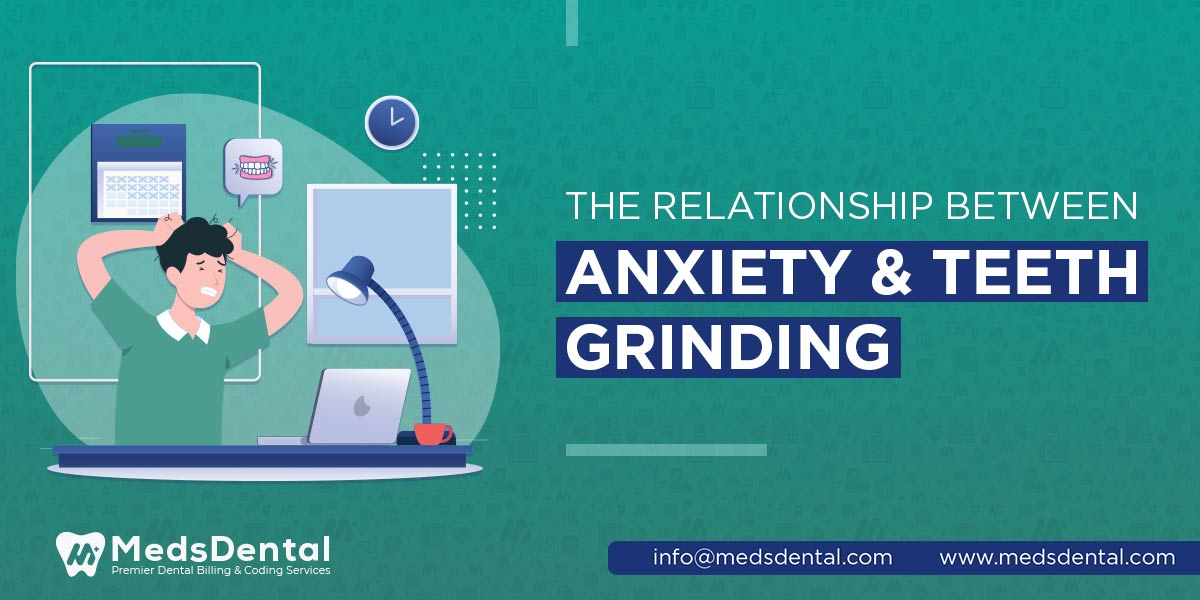

Have you ever woken up to a sore jaw or a headache, wondering why your teeth hurt? The cause may be the teeth grinding. On the other hand, anxiety is a common experience affecting many people worldwide. While it can manifest in various ways, one common-known symptom of anxiety is teeth grinding. The relationship between anxiety and teeth grinding is complex and multifaceted, with anxiety being both a cause and consequence of this condition. Whether you are struggling with anxiety, bruxism, or both, understanding the connection between the two can help you take steps toward finding relief and improving your oral health.
This post will explore the relationship between anxiety and teeth grinding, examining the causes and effects of this condition and discussing ways to manage and alleviate its symptoms.
Bruxism is a condition that involves the habitual grinding, clenching, or gnashing of teeth, typically occurring during sleep, but can also occur during the day, i.e., clenching teeth while awake. It affects up to 20% of adults and can cause various dental and health problems.
Causes of teeth grinding:
The exact cause of bruxism is poorly understood but considered multifactorial. Some of the potential reasons include the following:
What are the symptoms of bruxism? The symptoms of bruxism can vary from person to person, but some of the most common ones include the following:
Teeth grinding is a parafunctional habit that usually occurs during sleep. Stress has been identified as one of the most common risk factors for bruxism. Numerous studies have shown a significant correlation between stress and bruxism.
Mechanism: The exact mechanism behind the stress-teeth grinding connection is not fully understood; however, it is believed to involve
Central nervous system:
The main concern is “why does anxiety cause teeth grinding?” it is believed to be related to the activation of the central nervous system. Stress activates the sympathetic nervous system, which triggers the “fight or flight” response in the body, triggering the release of stress hormones, such as cortisol and adrenaline, which can increase muscle tension and activity, including the muscles involved in chewing. This muscle tension may contribute to clenching.
Genetic factor:
Furthermore, specific individuals may have a genetic predisposition to stress-related bruxism. According to a study published in the Journal of Clinical Sleep Medicine in 2016, individuals with a family history of bruxism were more likely to experience bruxism during times of stress.
Poor-quality sleep: The mechanism behind sleep-related stress and bruxism link can be explained as follows:
Stress: Many people clench their teeth in response to stress or anxiety. This habit is often unconscious, leading to jaw pain and tension headaches.
Emotional stress:
Anxiety:
Depression:
Dental problems: Some people may clench their teeth due to dental issues such as:
In such cases, clenching can be a subconscious attempt to compensate for the dental issue.
Medications: Certain medications, such as selective serotonin reuptake inhibitors (SSRIs) used to treat depression, and anxiety, can cause teeth clenching as a side effect.
Lifestyle habits: Some habits, such as chewing gum or biting pens or pencils, can lead to teeth clenching during the daytime.
If you suspect you are clenching your teeth during the daytime, you must consult a dentist or doctor to determine the underlying cause and receive appropriate treatment.
Prevention is the best treatment for stress-related bruxism. The following tips can help prevent the development of bruxism:
It is essential to know how to stop clenching jaw from stress. So here are some of the most beneficial and acceptable treatments.
Mouth guards or Night guards: Night guards are dental appliances designed to be worn over the teeth during sleep.
So, What are the advantages of a custom-made night guard?
Orthodontic treatment: Straightening teeth through orthodontic treatment can sometimes alleviate bruxism by improving the teeth and bite alignment.
Restorative dentistry: In those cases when bruxism has caused significant damage to the teeth, restorative treatments such as Crowns, bridges, or dental implants may be necessary.
Cognitive behavioral therapy (CBT) is a form of talk therapy that can help individuals with bruxism identify and change the negative thought patterns and behaviors contributing to their condition. CBT is effective in reducing the severity of bruxism symptoms.
In some cases, medications may be prescribed to alleviate the symptoms of bruxism.
Biofeedback therapy is a non-invasive treatment that uses electronic sensors to monitor muscle activity in the jaw and teach the patient how to control their muscle activity. The therapy can be performed in a clinical setting or at home using a biofeedback device. The therapy is effective in reducing bruxism symptoms.
Are you struggling with the revenue of your dental practice and want the best solution? MedsDental Dental Billing Company is the perfect choice for you because of the expertise in our services. Having experience of a couple of years, our coders and billers take every step of billing by sticking to HIPAA-compliant services and ensure proficiency and accuracy by getting the help of modern technology. Our professionals are always dedicated to time management for timely claim submission and increasing your organization’s revenue by leading smooth RCM. So, you are allowed to treat bruxism for your patients, and we will handle the billing department of your practice professionally.
Suture placement and removal, limited bone smoothing, closure, and routine follow-up are all included in the D7210 fee. The procedure is limited to one per tooth in Lifetime.
© MedsDental. All rights reserved 2026. Powered by MeshSq.